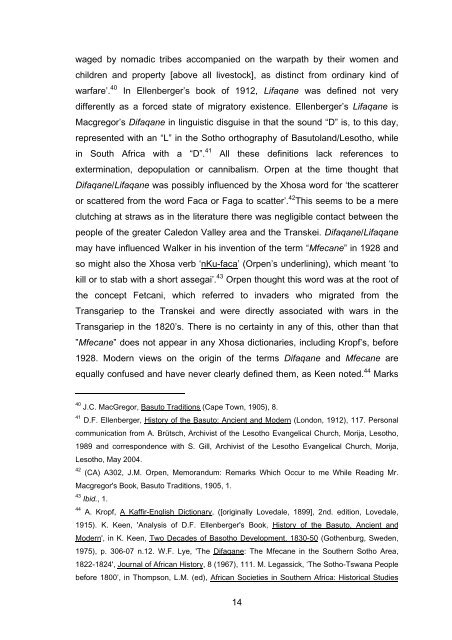The Historiographical Development of the Concept “mfecane” and ...
The Historiographical Development of the Concept “mfecane” and ...
The Historiographical Development of the Concept “mfecane” and ...
Create successful ePaper yourself
Turn your PDF publications into a flip-book with our unique Google optimized e-Paper software.
waged by nomadic tribes accompanied on <strong>the</strong> warpath by <strong>the</strong>ir women <strong>and</strong><br />
children <strong>and</strong> property [above all livestock], as distinct from ordinary kind <strong>of</strong><br />
warfare’. 40 In Ellenberger’s book <strong>of</strong> 1912, Lifaqane was defined not very<br />
differently as a forced state <strong>of</strong> migratory existence. Ellenberger’s Lifaqane is<br />
Macgregor’s Difaqane in linguistic disguise in that <strong>the</strong> sound “D” is, to this day,<br />
represented with an “L” in <strong>the</strong> Sotho orthography <strong>of</strong> Basutol<strong>and</strong>/Lesotho, while<br />
in South Africa with a “D”. 41 All <strong>the</strong>se definitions lack references to<br />
extermination, depopulation or cannibalism. Orpen at <strong>the</strong> time thought that<br />
Difaqane/Lifaqane was possibly influenced by <strong>the</strong> Xhosa word for ‘<strong>the</strong> scatterer<br />
or scattered from <strong>the</strong> word Faca or Faga to scatter’. 42 This seems to be a mere<br />
clutching at straws as in <strong>the</strong> literature <strong>the</strong>re was negligible contact between <strong>the</strong><br />
people <strong>of</strong> <strong>the</strong> greater Caledon Valley area <strong>and</strong> <strong>the</strong> Transkei. Difaqane/Lifaqane<br />
may have influenced Walker in his invention <strong>of</strong> <strong>the</strong> term “Mfecane” in 1928 <strong>and</strong><br />
so might also <strong>the</strong> Xhosa verb ‘nKu-faca’ (Orpen’s underlining), which meant ‘to<br />
kill or to stab with a short assegai’. 43 Orpen thought this word was at <strong>the</strong> root <strong>of</strong><br />
<strong>the</strong> concept Fetcani, which referred to invaders who migrated from <strong>the</strong><br />
Transgariep to <strong>the</strong> Transkei <strong>and</strong> were directly associated with wars in <strong>the</strong><br />
Transgariep in <strong>the</strong> 1820’s. <strong>The</strong>re is no certainty in any <strong>of</strong> this, o<strong>the</strong>r than that<br />
”Mfecane” does not appear in any Xhosa dictionaries, including Kropf’s, before<br />
1928. Modern views on <strong>the</strong> origin <strong>of</strong> <strong>the</strong> terms Difaqane <strong>and</strong> Mfecane are<br />
equally confused <strong>and</strong> have never clearly defined <strong>the</strong>m, as Keen noted. 44 Marks<br />
40 J.C. MacGregor, Basuto Traditions (Cape Town, 1905), 8.<br />
41 D.F. Ellenberger, History <strong>of</strong> <strong>the</strong> Basuto: Ancient <strong>and</strong> Modern (London, 1912), 117. Personal<br />
communication from A. Brütsch, Archivist <strong>of</strong> <strong>the</strong> Lesotho Evangelical Church, Morija, Lesotho,<br />
1989 <strong>and</strong> correspondence with S. Gill, Archivist <strong>of</strong> <strong>the</strong> Lesotho Evangelical Church, Morija,<br />
Lesotho, May 2004.<br />
42 (CA) A302, J.M. Orpen, Memor<strong>and</strong>um: Remarks Which Occur to me While Reading Mr.<br />
Macgregor's Book, Basuto Traditions, 1905, 1.<br />
43 Ibid., 1.<br />
44 A. Kropf, A Kaffir-English Dictionary, ([originally Lovedale, 1899], 2nd. edition, Lovedale,<br />
1915). K. Keen, 'Analysis <strong>of</strong> D.F. Ellenberger's Book, History <strong>of</strong> <strong>the</strong> Basuto, Ancient <strong>and</strong><br />
Modern', in K. Keen, Two Decades <strong>of</strong> Basotho <strong>Development</strong>, 1830-50 (Go<strong>the</strong>nburg, Sweden,<br />
1975), p. 306-07 n.12. W.F. Lye, '<strong>The</strong> Difaqane: <strong>The</strong> Mfecane in <strong>the</strong> Sou<strong>the</strong>rn Sotho Area,<br />
1822-1824', Journal <strong>of</strong> African History, 8 (1967), 111. M. Legassick, ‘<strong>The</strong> Sotho-Tswana People<br />
before 1800’, in Thompson, L.M. (ed), African Societies in Sou<strong>the</strong>rn Africa: Historical Studies<br />
14

















